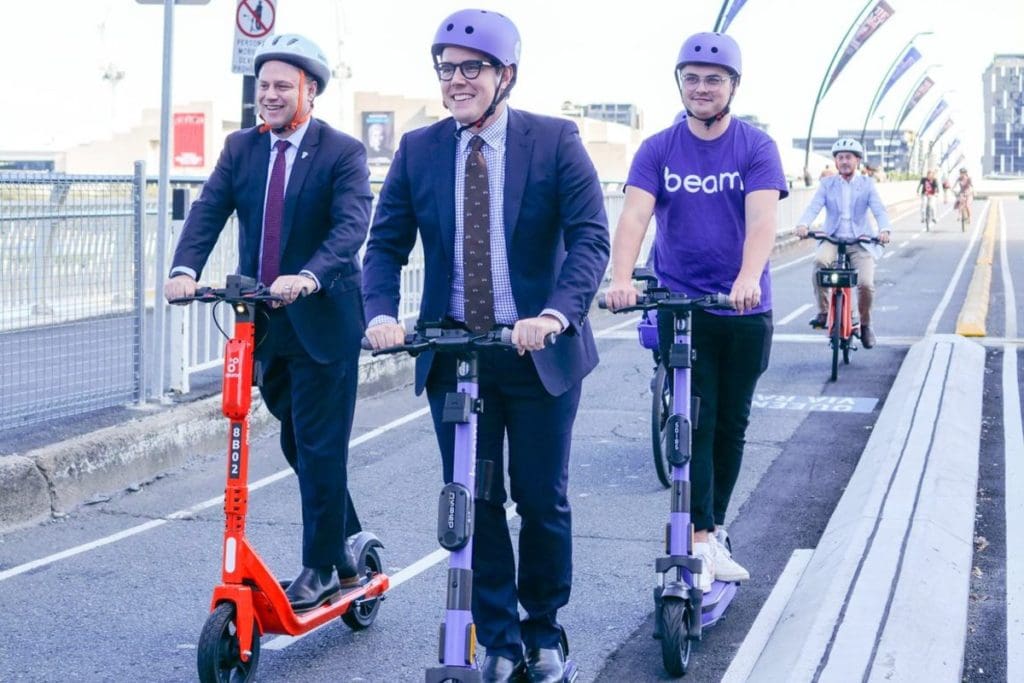Dockless E-bikes to Join Expanding Brisbane Scooter Fleet from July

Brisbane, Qld
Eight-hundred dockless bikes will join a growing fleet of electric scooters on Brisbane streets within weeks, as the city council unveiled what it described as a world-first strategy for the sector.
On Tuesday 1st June, Brisbane Lord Mayor Adrian Schrinner announced that Beam, which hosts its purple bikes and scooters in several other Australian cities, would take Lime’s place as the second company to step in with a pedal-powered replacement for the failed CityCycle scheme, along with Neuron Mobility.
The council’s Labor opposition said the long-awaited strategy failed to address safety issues raised by pedestrian and disability groups around the vehicles’ use and parking on footpaths, or questions around enforcement when the devices were dumped in public spaces.
But Cr Schrinner insisted safety had been a key focus of the expansion, which has seen more than 4 million rides taken by 1.4 million people since the first scooters hit Brisbane streets in November 2018.
“Brisbane has been a leader in e-mobility. Following a competitive tender process, Neuron and Beam were chosen for their strong track record and commitment to safety and sustainability,” Cr Schrinner said.
“Every single person who jumps on an e-scooter or e-bike is one less car on our road, so this initiative is busting congestion and building a more sustainable Brisbane.”
Both Beam and Neuron will hold an equal share of the new bikes set to appear on Brisbane streets from July 22, along with an expanded total of 2,000 e-scooters.
The operators were picked from a field of six companies vying for the three-year contracts, set to deliver the council an undisclosed sum and be underpinned by the e-mobility strategy also released by the council on Tuesday after public consultation.
Cr Schrinner said existing CityCycle docking sites, still to be decommissioned, would be among the 15 e-mobility hubs to provide dedicated parking for the bikes and scooters by the July launch.
He said users and operators were considered responsible for ensuring the vehicles were not left in inappropriate places.
Geofencing technology will block scooters and bikes from late-night districts, with a growing body of research from south-east Queensland hospitals and universities suggesting a large portion of injuries occurred at night, without the use of helmets and under the influence of alcohol.
The strategy will also aim to limit speeds in high-pedestrian areas, require operators to carry third-party insurance, offer discounts to disadvantaged communities and expand further beyond the CBD.
Cr Schrinner said council data showed between 30 and 50 per cent of e-scooter and e-bike trips were replacing car trips in Brisbane.
Patronage on e-scooters is back to pre-COVID levels, while public transport remains at about 70 per cent of pre-COVID use.
The lord mayor said Beam and Neuron were successful after demonstrating key safety features, with both offering the ability to ‘geo-fence’ scooters away from high-risk pedestrian areas, helmets locked to bikes and scooters, and the option to reward users for safe scooter use.
Beam is one of the largest operators of e-mobility schemes in Australia, while Singaporean company Neuron has been operating in Brisbane since 2019 during the council’s extended e-scooter trial.
Cr Schrinner said the highly-competitive market had pushed out existing e-scooter company Lime.
“They were pioneers when it came to the very first scooter trial here, but now this is a very competitive space,” he said.
“Over 900 individuals and stakeholder groups provided feedback on our strategy; raising issues like safety and infrastructure, so the strategy includes key actions such as speed limits in pedestrian areas, late-night e-scooter lockouts, safety initiatives, e-mobility parking areas and better consideration for charging facilities.
“More than just safety and infrastructure, we know that about 1 in 5 e-scooter trips in Brisbane ends in a purchase, which shows us that e-mobility is becoming increasingly important for the local economy.
The e-bikes will replace the council’s costly CityCycle scheme, which was subsidised by residents to the tune of $16 million over more than 10 years before it was scrapped late last year. But the CityCycle scheme had fundamental problems. Being non e-powered in hilly and often hot and humid Brisbane, having a relatively user hostile operating system, restrictive hours, wide spacing of docking stations and poor cycling infrastructure all contributed to the failure.
The exact amount paid to Brisbane City Council by Beam and Neuron for the new contracts remains ‘commercial in confidence’.
The CityCycle fleet is gradually being phased out during the transition to e-bikes.
Beam and Neuron will roll out their electric fleet of e-bikes and e-scooters from 22 July.
Much of this article was first published in the Sydney Morning Herald, some was first published on ABC News, some is from the official media release and some is original content.
